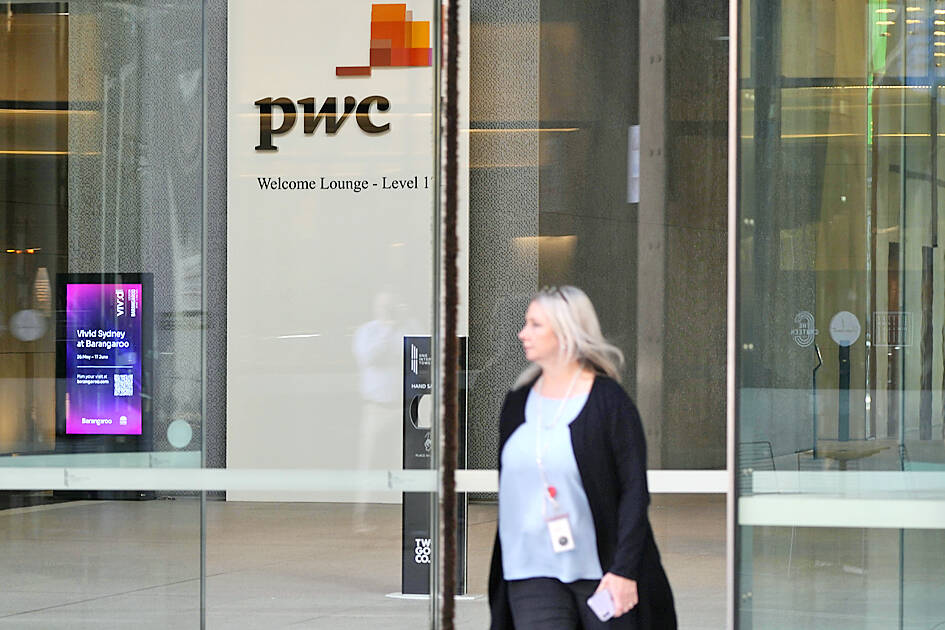Geopolitical conflict risks constitute the top worry among Taiwan’s chief executive officers, far higher than their global and Asia-Pacific peers, as their concerns over inflation ease, PricewaterhouseCoopers (PwC) Taiwan said yesterday, citing an annual worldwide survey of CEOs.
Globally, 38 percent of CEOs are expecting improved economic growth this year, while the proportion rises to 40 percent among Asia-Pacific counterparts and up to 48 percent among local business leaders, according to the survey that gathered responses from 4,702 CEOs worldwide.
The sentiment findings on economic outlook suggested a pickup of double percentage points from last year as global monetary tightening and inventory adjustments come to an end, the consultancy firm said, pointing out that the uptick reached 30 percent in Taiwan.

Photo: AP
Although business leaders are more optimistic about the economy, geopolitical conflicts remain one of the main threats and enterprises have begun to shift their global supply chains into regional supply chains to curtail risks and maintain normal operations, it said.
The survey showed that 39 percent of Taiwanese CEOs believed that geopolitical conflicts pose a major threat to their businesses, higher than their global and Asia-Pacific peers, both at 18 percent.
Against that backdrop, companies need to abandon old mindsets and chart out new organizational structures, and set up branch offices overseas with substantial operational functions when making regional deployments, PwC Taiwan chairman Joseph Chou (周建宏) said, adding that companies need to make the best use of digital tools, build multinational management teams and tap local talent pools toward that end.
The survey showed that CEOs have had mixed success at meeting their climate change-related objectives.
About 66 percent of the respondents said they have efforts underway to enhance energy efficiency and 10 percent said they have completed such initiatives.
About 50 percent of respondents indicated they have work in progress to innovate environment-friendly products or services.
The survey indicated that CEOs in western Europe are more likely to have energy efficiency and climate-oriented innovation initiatives in progress or completed, while CEOs everywhere else accept lower hurdle rates for climate-friendly investments.
Companies are stepping up efforts to move toward the target of net zero carbon emissions, but they face many challenges, the survey showed.
In Taiwan, 75 percent of respondents said “complicated regulations and frequent changes” pose the biggest challenges for companies to reduce carbon emissions, while low investment returns on climate-friendly investments and the lack of such technologies are serious hurdles, it said.

Taiwan Semiconductor Manufacturing Co (TSMC, 台積電) would not produce its most advanced technologies in the US next year, Minister of Economic Affairs J.W. Kuo (郭智輝) said yesterday. Kuo made the comment during an appearance at the legislature, hours after the chipmaker announced that it would invest an additional US$100 billion to expand its manufacturing operations in the US. Asked by Taiwan People’s Party Legislator-at-large Chang Chi-kai (張啟楷) if TSMC would allow its most advanced technologies, the yet-to-be-released 2-nanometer and 1.6-nanometer processes, to go to the US in the near term, Kuo denied it. TSMC recently opened its first US factory, which produces 4-nanometer

PROTECTION: The investigation, which takes aim at exporters such as Canada, Germany and Brazil, came days after Trump unveiled tariff hikes on steel and aluminum products US President Donald Trump on Saturday ordered a probe into potential tariffs on lumber imports — a move threatening to stoke trade tensions — while also pushing for a domestic supply boost. Trump signed an executive order instructing US Secretary of Commerce Howard Lutnick to begin an investigation “to determine the effects on the national security of imports of timber, lumber and their derivative products.” The study might result in new tariffs being imposed, which would pile on top of existing levies. The investigation takes aim at exporters like Canada, Germany and Brazil, with White House officials earlier accusing these economies of

GREAT SUCCESS: Republican Senator Todd Young expressed surprise at Trump’s comments and said he expects the administration to keep the program running US lawmakers who helped secure billions of dollars in subsidies for domestic semiconductor manufacturing rejected US President Donald Trump’s call to revoke the 2022 CHIPS and Science Act, signaling that any repeal effort in the US Congress would fall short. US Senate Minority Leader Chuck Schumer, who negotiated the law, on Wednesday said that Trump’s demand would fail, while a top Republican proponent, US Senator Todd Young, expressed surprise at the president’s comments and said he expects the administration to keep the program running. The CHIPS Act is “essential for America leading the world in tech, leading the world in AI [artificial

REACTIONS: While most analysts were positive about TSMC’s investment, one said the US expansion could disrupt the company’s supply-demand balance Taiwan Semiconductor Manufacturing Co’s (TSMC, 台積電) new US$100 billion investment in the US would exert a positive effect on the chipmaker’s revenue in the medium term on the back of booming artificial intelligence (AI) chip demand from US chip designers, an International Data Corp (IDC) analyst said yesterday. “This is good for TSMC in terms of business expansion, as its major clients for advanced chips are US chip designers,” IDC senior semiconductor research manager Galen Zeng (曾冠瑋) said by telephone yesterday. “Besides, those US companies all consider supply chain resilience a business imperative,” Zeng said. That meant local supply would